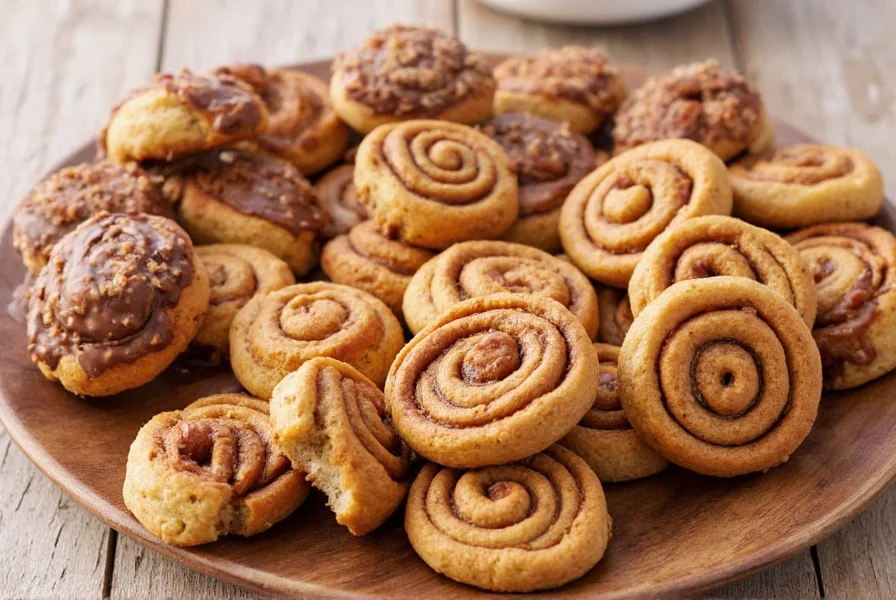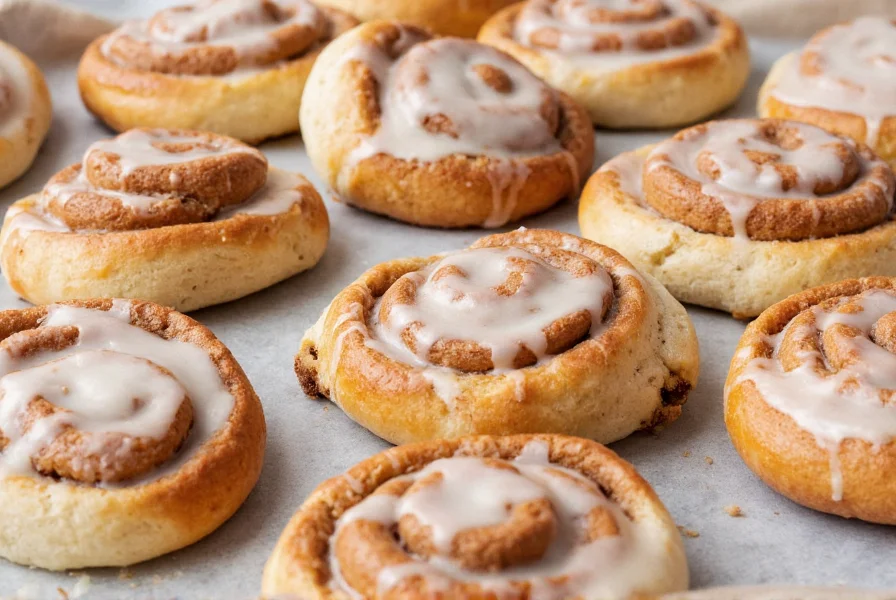These miniature delights have gained popularity for their convenience and nostalgic flavor profile. While traditional cinnamon rolls require yeast and lengthy rising times, cinnamon roll cookies use a quick cookie dough base that bakes in just 10-12 minutes, making them ideal for spontaneous baking sessions or dessert emergencies.
The Science Behind Perfect Cinnamon Roll Cookies
Understanding the chemistry behind these treats separates good from great results. The magic happens through three key processes:
| Component | Function | Optimal Ratio |
|---|---|---|
| Butter temperature | Affects spread and texture | Slightly softened (65°F/18°C) |
| Sugar composition | Creates chewiness and caramelization | 60% brown sugar, 40% granulated |
| Cinnamon filling density | Determines swirl definition | 1:4 filling-to-dough ratio |
Room-temperature butter creates the ideal emulsion with sugars, while the specific sugar blend ensures proper spread without becoming cakey. The filling-to-dough ratio prevents leakage while maintaining visible swirls - a common pain point for beginners attempting easy cinnamon roll cookies recipe variations.
Essential Ingredients Breakdown
While many copycat Cinnabon cinnamon roll cookies recipes exist, understanding ingredient roles leads to better customization:
- All-purpose flour: Provides structure without excessive chewiness. For gluten-free versions, use a 1:1 substitute blend with xanthan gum.
- Brown sugar: Contributes moisture and butterscotch notes through molasses content. Dark brown sugar intensifies flavor.
- Cinnamon quality: True Ceylon cinnamon offers delicate flavor, while Cassia provides stronger punch. Grind whole sticks for maximum freshness.
- Cream cheese frosting: The tangy contrast balances sweetness. For dairy-free options, coconut cream with powdered sugar works surprisingly well.

Step-by-Step Baking Guide
Follow these professional techniques for flawless results every time:
- Prepare the dough: Cream butter and sugars until light (3-4 minutes). Over-creaming causes excessive spread in your soft cinnamon roll cookies.
- Create the filling: Mix cinnamon, sugar, and a pinch of salt. Adding 1 tsp cornstarch prevents sugar crystallization.
- Roll precisely: Roll dough to 12x8 inch rectangle, spread filling evenly, then roll tightly from the long side.
- Chill thoroughly: Freeze rolled log for 20 minutes before slicing. This prevents flat cinnamon roll cookies and maintains swirl definition.
- Bake strategically: Place cookies 2 inches apart on parchment-lined sheets. Bake at 350°F (175°C) for 10-12 minutes until edges are golden.
Troubleshooting Common Issues
Even experienced bakers encounter these challenges with homemade cinnamon roll cookies:
- Filling leakage: Caused by insufficient chilling or overfilling. Solution: Freeze log longer and reduce filling by 15%.
- Flat cookies: Results from warm dough or too much butter. Fix: Chill dough 30 minutes before baking and measure butter precisely.
- Hard texture: Often from overbaking or incorrect flour measurement. Tip: Use spoon-and-level method for flour and check cookies at 9 minutes.
- Faint cinnamon flavor: Low-quality cinnamon or insufficient quantity. Recommendation: Use 2 tbsp premium cinnamon per batch.
Creative Variations Worth Trying
Elevate your best cinnamon roll cookies with these professional twists:
- Maple-bacon version: Add 1/4 cup crumbled bacon and 2 tbsp maple syrup to the filling
- Apple pie fusion: Layer 1/4 cup finely diced apples between filling and dough
- Chocolate-dipped: Melt 4 oz dark chocolate for post-bake dipping (add 1 tsp coconut oil for shine)
- Vegan adaptation: Substitute butter with vegan sticks and use flax eggs (1 tbsp ground flax + 3 tbsp water per egg)

Storage and Serving Recommendations
Maximize freshness with these pro tips:
- Store unfrosted cookies in airtight container for up to 5 days
- Freeze dough logs for up to 3 months - slice and bake directly from frozen (add 2-3 minutes baking time)
- Apply frosting just before serving to prevent sogginess in your chewy cinnamon roll cookies
- Reheat leftovers at 300°F (150°C) for 3 minutes to restore freshness
Frequently Asked Questions
Can I make cinnamon roll cookies without a stand mixer?
Yes, you can make cinnamon roll cookies with just a hand mixer or even by hand. Cream the butter and sugars thoroughly with a wooden spoon for 5-7 minutes until light and fluffy. The key is ensuring proper aeration in the dough, which creates the signature soft texture in no-mixer cinnamon roll cookies.
Why do my cinnamon roll cookies spread too much?
Excessive spreading typically occurs when the dough is too warm or contains too much butter. Chill the rolled log for at least 20 minutes before slicing, and measure butter precisely using the spoon-and-level method. For high-altitude baking, reduce butter by 1-2 tablespoons to prevent flat cinnamon roll cookies.
How can I make my cinnamon roll cookies more flavorful?
Boost flavor by using freshly ground cinnamon sticks instead of pre-ground powder, adding a pinch of cardamom or nutmeg to the filling, and incorporating 1/4 teaspoon of espresso powder into the dough. For copycat Cinnabon cinnamon roll cookies, increase cinnamon to 2 tablespoons and use dark brown sugar for deeper molasses notes.
Can I prepare cinnamon roll cookie dough ahead of time?
Absolutely. You can refrigerate the rolled dough log for up to 48 hours before baking, or freeze it for up to 3 months. When ready to bake, slice frozen dough directly (no thawing needed) and add 2-3 minutes to the baking time. This make-ahead technique works perfectly for soft cinnamon roll cookies whenever cravings strike.
What's the ideal thickness for slicing cinnamon roll cookie dough?
For optimal results, slice the chilled dough log into 3/4-inch thick rounds. Thinner slices (1/2 inch) create crisper cookies with more edge caramelization, while thicker slices (1 inch) yield softer, cake-like centers. The 3/4-inch thickness provides the perfect balance for chewy cinnamon roll cookies with defined swirls.











 浙公网安备
33010002000092号
浙公网安备
33010002000092号 浙B2-20120091-4
浙B2-20120091-4